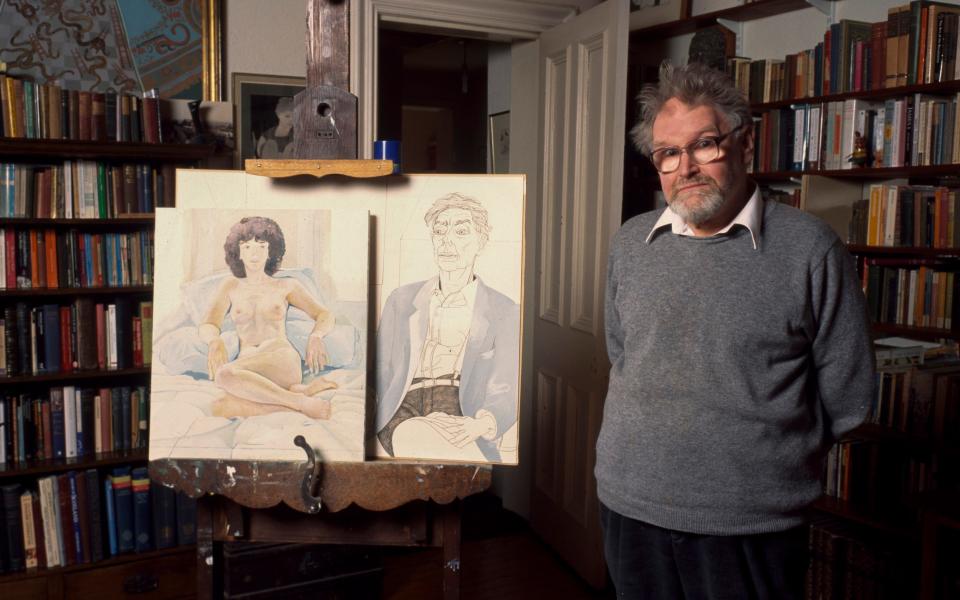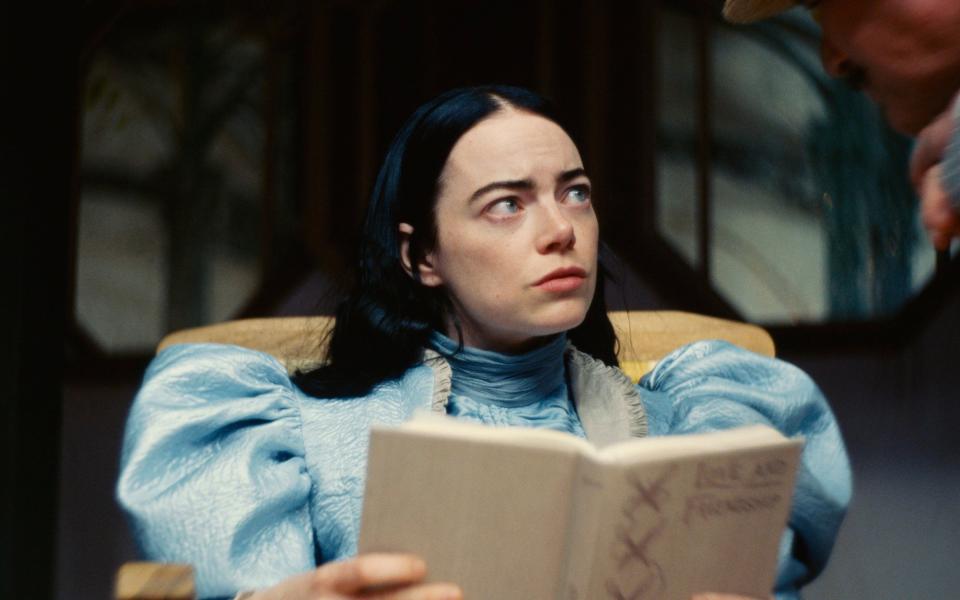Sex and Scottish nationalism: the ‘deranged and unstable’ life of Poor Things author Alasdair Gray

In his typically rambunctious, faintly chaotic speech that he made when his film Poor Things won Best Musical or Comedy film at this year’s Golden Globes, its director Yorgos Lanthimos acknowledged “my hero” Bruce Springsteen – twice – and the “wonderful actors” he had worked with, including, of course, the film’s star Emma Stone, who he lauded as “the best”.
It is a surprise that a film as eccentric, not to mention sexually frank, as Poor Things might triumph at the Globes, which was expected to recognise the altogether more commercial Barbie. But nonetheless, cineastes should take heart in the knowledge that a picture revolving around the sexual and social odyssey of a young woman brought back to life by a mad scientist can triumph over the social and political odyssey of a young woman.
Yet there was one curious omission in Lanthimos’s speech, which could be put down either to excitement or carelessness. Poor Things is adapted from an award-winning 1992 novel by the Scottish writer Alasdair Gray, which was widely acclaimed upon its publication and won its author the Whitbread Novel Award, as well as the Guardian Fiction Prize. In a recent interview with the Telegraph’s film critic Robbie Collin, Poor Things’ screenwriter Tony McNamara recounted how Lanthimos, after moving to Britain in 2011, sought out Gray in his native Glasgow to win his approval for the adaptation.
After taking the surprised director on a walking tour of his favourite places in the city, the author gave him his blessing, saying that he had enjoyed Lanthimos’s absurdist 2009 comedy-drama Dogtooth, something that McNamara described as “incredibly generous of him… Yorgos was overjoyed.”
Gray died on December 29 2019 so never lived to see his most accessible novel filmed, although he almost certainly saw McNamara and Lanthimos’s previous collaboration, the award-winning period black comedy The Favourite, which was released in the UK at the beginning of that year. Had he seen Poor Things receive the adulation it has been greeted with, it is likely that he – a famously eccentric and unworldly figure – would have finally been grateful for the recognition and accompanying financial security that the film adaptation would have brought him.
He once said of himself, without undue modesty, “I am a well-known writer who cannot make a living from his writing”. And, despite being lauded on his death by his former First Minister Nicola Sturgeon as “one of Scotland’s literary giants… one of the brightest intellectual and creative lights Scotland has known in modern times”, he spent his life being described as “the best novelist you’ve never read.”
Poor Things was praised by Sturgeon as “my personal favourite from his incredible body of work”, although Lanthimos’s full-frontal adaptation – rated 18 for “strong sex, nudity and very strong language” – is a determinedly adults-only affair. This would, one imagines, have suited its author admirably, given his refusal to pander to commercial mores. He first came to prominence in 1981 with his debut novel Lanark, which he had begun writing as a student in the 1950s and was rejected by the literary agency Curtis Brown, presumably with a sense of mystification: a postmodernist odyssey through contemporary and historic Glasgow, its blend of Laurence Sterne, underground Scottish novelist Alexander Trocchi and Nineteen Eighty-Four was so wildly out of kilter with the prevailing literary sympathies of the era that it must have seemed as if an alien had written it.
It would not make its way into print for nearly two decades, albeit in much revised form. During the intervening period, Gray, who once proudly described himself as “a deranged and rather unstable creature”, made a living as a freelance artist, painting murals and designs for everything from theatrical scenery to cafes. A couple of his artworks still survive today, in the Ubiquitous Chip restaurant and on Hillhead subway station in the city.
Gray was fortunate in that, although he was not yet a published author, he carried with him an innate sense of mystery leavened with nascent talent, which tended to excite the bounty of bureaucrats tasked with handing out grants. Accordingly, he was able to receive a hand-out from the Scottish Arts Council to continue with Lanark as a work-in-progress, as well as being writer-in-residence at the University of Glasgow between 1977 and 1979.

Had Lanark proved to be a flop, then he would have been swiftly forgotten, consigned to history with other authors who proved better at the business of self-publicising than actually writing novels. Yet on its eventual publication in 1981, it was instead acclaimed by none other than Anthony Burgess, who declared: “It was time Scotland produced a shattering work of fiction in the modern idiom. This is it.” He also called Gray, “the most important Scottish writer since Sir Walter Scott.” It mixed apparently autobiographical elements in its narrative of the artist Duncan Thaw and his life in Fifties Glasgow with the fantastical and surreal, as the character of Lanark must deal with the authorities, expressed by the bodies of The Council and The Institute. Unusually, but effectively, it even contained illustrations by the author.
Although it was not shortlisted for the Booker Prize, it won the Scottish Arts Council Book of the Year award, strengthening Gray’s love and affection for the loyalty that his home country had placed in him for many years. Sturgeon’s encomium to him after his death might be viewed in the context of his undying adherence to the cause of Scottish nationalism. Long before the SNP had become the dominant force in his country’s politics, he had written the 1992 pamphlet Why Scots Should Rule Scotland, and was no fan of English residents of Scotland, calling them “settlers” or “colonists”, although he always claimed not to be anti-English, perhaps with a view to that country’s grant and prize-giving committees.
Nonetheless, Sturgeon’s warm praise for him omitted one salient fact that might have embarrassed her; shortly before his death, he voted Labour, saying he was “very pleased” with Jeremy Corbyn and that “if I were to write a pamphlet now, which I thought of doing, it would be highly critical of the Scottish National Party”.
Certainly, during the decade-long gap between the publication of Lanark and Poor Things, Gray was in danger of falling into irrelevance. After the lengthy gestation of his debut novel, his second book, 1982, Janine (1984), appeared in a comparatively swift three years, and Gray subsequently regarded it as his finest achievement. If Orwell and Enlightenment writers were the touchstones for Lanark, then 1982, Janine’s heavy use of pornography as a structural and thematic device might be seen as being indebted to Joyce or Genet by the generous, or simply a reflection of its author’s tormented psyche by the more critical. It split opinion on publication.
William Boyd (whose own novel The New Confessions can be seen as a seemlier version of Gray’s influences) called it “limpid and classically elegant” in its style, whereas the poet and priest Peter Levi spluttered that it was “radioactive hogwash”. With typical eccentricity, for the paperback edition, Gray published the positive and negative reviews alongside one another in an appendix, so readers could make up their own minds.
Despite this thoughtfulness, it was not a commercial success, nor were any of his subsequent novels published in the decade. By the time that he had published his rather strained study of office-based sexual fetishism Something Leather in 1990, he all-but-acknowledged that he had run out of ideas, writing in the book’s epilogue that “having discovered how my talent worked it was almost certainly defunct. Imagination will not employ whom it cannot surprise.”
Which is why his triumphant return two years later with his most purely enjoyable novel, Poor Things, should be all the more celebrated. McNamara may have made several changes to the structure in the form of his adaptation – and, presumably to Gray’s posthumous ire, changed its initial setting from Victorian Glasgow to London – but its quixotic, often filthy heart remains the same, which means that both novel and film can be enjoyed as the products of a rare and vivid imagination.

Following the success of Poor Things, Gray continued to publish novels and short stories to critical acclaim, albeit not commercial success. He was obliged to go cap-in-hand to the Scottish Artists’ Benevolent Fund for financial assistance in 2000, and his public interviews and statements became increasingly belligerent. He would growl that “Lanark won the publishers – not me – a design award” and took delight in playing the ornery old author with younger journalists, although this could be put down to shyness as much as hostility.
When the writer and art curator Natasha Hoare asked him, “Both Something Leather and 1982, Janine are full of sadomasochistic fantasy; you’ve stated previously that you can’t reread the latter, despite it being one of your best books. How did it feel to release this intensely personal vision to the public?”, he simply replied: “Pleasant.”
It was just as well for Lanthimos that he encountered the author in 2011, as Gray seriously injured himself in a fall in 2015 and was confined to a wheelchair for the rest of his life, although he continued to work until the end. The last things that he did, appropriately enough, were to publish translations of the first two parts of the Divine Comedy, Hell and Purgatorio, “decorated and Englished in prosaic verse”, and shortly before his death, he was awarded the first Saltire Society Scottish Lifetime Achievement award.
Perhaps this would have meant more to him than any number of Golden Globe awards; certainly, cinema played less of a role in his life and career than literature, art and theatre did. Still, with the film adaptation of Poor Things heavily tipped for Oscar nominations, possibly even awards, a man who once described himself as a “a fat, spectacled, balding, old Glaswegian pedestrian who has mainly lived by writing and designing books, most of them fiction” will finally come to the attention of an entirely new readership.
And who knows, if Nicola Sturgeon’s much-publicised antics did ever result in a custodial sentence, at least she’d have plenty of time to read her much-beloved Gray.
Poor Things is in cinemas Jan 12


